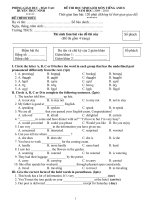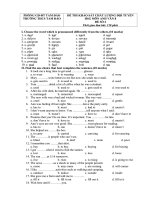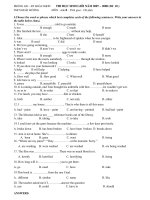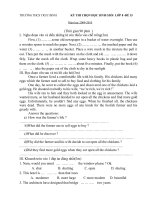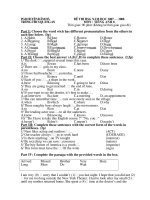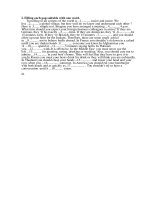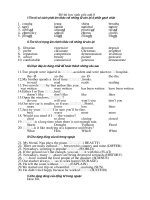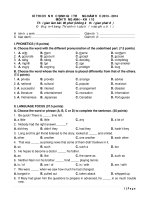- Trang chủ >>
- THPT Quốc Gia >>
- Địa lý
De HSG Anh 8 2013 2014
Bạn đang xem bản rút gọn của tài liệu. Xem và tải ngay bản đầy đủ của tài liệu tại đây (118.07 KB, 5 trang )
<span class='text_page_counter'>(1)</span>Phßng Gi¸o Dôc- §T. §Ò kh¶o s¸t chän häc sinh giái cÊp huyÖn N¨m häc 2013- 2014 M«n: tiÕng anh 8 (Thêi gian lµm bµi: 120 phót). I) From each number, pich out one word whose underlined part is pronounced differently from the others. 1) a-perform b-colour c-boring d-your 2) a-bath b-watch c-want d-water 3) a-thank b-think c-father d-them 4) a-happen b-house c-hour d-horse 5) a-filled b-destroyed c-wished d-prepared 6) a-flow b-crowd c-cloud d-scout II) From each number, pick out one word which has the stress on the second syllable: 7) a-chemical b-upset c-steamer d-cupboard 8) a-jungle b-volcano c-surround d-marine 9) a-foreman b-microwave c-manufactor d-mortar 10) a-powder b-process c-flavour d-defrost III) Choose the correct answer for each sentence. 11) Please ask them . . . . . . . . . . in this area. a) don’t smoke b) not smoking c) to not smoke d) not to smoke 12) Come and . . . . . . . . . . . . badminton, Nam! a) do b) makec) take d) play 13) Timson . . . . . 13 films and I think her latest is the best. a) made b) had made c) has made d)was making 14) My birthday is . . . . . . . . . . February 2nd. a) on b) in c) at d) from 15) You should learn your lesson . . . . . . . . . .a) careful b) carefully c) careless d) carelessly 16) “The students went on a canoe trip yesterday.” “I heard it was . . . . . . .” a) excited b) exciting c) excitefuld) an excitement 17) “Do you think your father will worry if we’re late?” “Maybe we’d better . . .. . . him.” a) call b) be calling to c) to call d) will call 18) I said “Happy Birthday” before . . . . . . . . . . Lan a present. a) give b) will give c) gave d) giving 19) Tam . . .. last night when the telephone . . . . . a) slept-rang b) slept-was ringing c) was sleeping-rang d)was sleeping-was ringing 20) “Would you like to go to the movie with me tonight?” “ - . . . . . .”a) Yes, please. b) I’m sorry. I’d love to. c) No, thanks. d) Yes, I’d love to. 21) John doesn’t play tennis. David doesn’t play tennis. a. Both John and David doesn’t play tennis. b. Neither John nor David plays tennis. c. Not either John or David plays tennis. d. Not only John but also David doesn’t play tennis. 22) The coach said, “It’s time for you to go home, boys!” a. The coach told the boys that it was time for you to go home. b. The coach tells the boys that it was time for them to go home. c. The coach told the boys that it is time for them to go home. d. The coach told the boys that it was time for them to go home. 23) _____ the old man spoke very slowly and clearly, I couldn’t understand him at all. a. If b. Because c. Since d. Although 24) She started learning English ten years ago. a) She has not learnt English before b) She has started learning English for ten years. c) She has learnt English for ten years. d) She has learnt English since ten years. 25) They spent a lot of money on food and clothes. a) A lot of money was spent on food and clothes. b) A lot of money were spent on food and clothes. c) A lot of money on food and clothes were spent. d) A lot of money on food and clothes was spent. 26) There is a detective film _____ at the Thang Long Theater. a) on b) in c) inside d) outside 27) She got used to _______ her bike. a) ride b) riding c) rode d) rides 28) You need a good pair of paddles to play _____. a) tennis b) football c) table tennis d) badminton.
<span class='text_page_counter'>(2)</span> 29) Ha Long Bay is a _____. a) World Natural Heritage. b) Natural World Heritage. c) World Cultural Heritage.d) Cultural World Heritage. 30) A(n) ______ can take a patient to hospital quickly.a) emergency b) bleeding c) wound d) ambulance IV) Complete the following sentences with an appropriate form of the word in brackets. (0) is an example for you. 31) Life is more . . . . . . . . . . now. (comfort) 32) Would you like to go . . . . . . . . . . . (swim) 33) He speaks French very . . .. . . . (good) 34) Life in the city is . . . . . . from life in the country. (difference) 35) Meat is not a .... food if we know how much to eat. (health) 36) These medicines can work well with your . . . . . (ill) 37) My sister has a beautiful . . . . . of stamp. (collect) 38) There was no . . . . . . . . . . for his absence from class yesterday. (explain) V) Circle the italized portion of the sentence that is incorrect. 39) Some people grow so taller that their health may become endangered. A B C D 40) After said goodbye to my parents, I went to school with my sister. A B C D 41) The phone rung while I was washing the dishes. A B C D 42) Henry’s friends told themselves to put his coat on the rack in their hall. A B C D 43) She isn’t old enough to done this job. A B C D 44) Eight hundred years ago Christmas songs are performed for people in towns and villages A B C D 45) Would you mind help me solve these mathematics problems? I can hardly understand how to do them. A B C D 46) She was having dinner when a man was coming and giving her a bunch of flowers. A B C D VI. Give the correct tense or form of the verb in brackets a. He couldn't make his motor bike (47.start ) ......... this morning. b. I dislike (48.listen ) ......... to music while (49.do) .......... my homework. c. These tigers used (50.keep) .......... in iron cages . d. What you (51.do) ........ when I 52.phone) ......... you last night ? e. When we entered his room, we (53.see) .......... him (54.sleep) ............... in an armchair. f. She said that her mother (55.not be) ...... very well, so she (56.can not) ......... go to the party. VII) Read the paragraphs below and the summary which follows. Air pollution is a cause of ill-health in human beings. In a lot of countries there are laws limiting the amount of smoke which factories can produce. Although there isn’t enough information on the effects of smoke in the atmosphere, doctors have proved that air pollution causes lung diseases. The gases from the exhausts of cars have also increased air pollution in most cities. The lead in petrol produces a poisonous gas which often collects in busy streets surrounded by high buildings. Children who live in areas where there is a lot of lead in the atmosphere can’t think as quickly as other children and are clumsy when they use their hands. There are other long-term effects of pollution. If the gases in the atmosphere continue to increase , the earth’s climate may become warmer. A lot of the ice near the Poles ma melt and may cause serious floods. * Complete the summary by writing the correct word in each blank (write one word only.) Air ___________ (57) can make people ___________ (58). Consequently, some countries pass ____________ (59) to control the quantity of ___________ (60) in the air. Air pollution causes particular damage to the body by harming the ___________ (61). _____________ (62) should not be used in petrol because it is bad for children’s _____________ (63) and makes them clumsy in using their hands. Poisonous gas from ____________ (64) collects in those parts of cities where there are tall buildings. Pollution can also have an influence on the earth’s ____________ (65). The ice may melt near the North and South Poles, resulting in very bad ____________ (66). VIII) Read the following passage and choose the best answer.
<span class='text_page_counter'>(3)</span> Every year students in many countries learn English. Some of these students are young children. Others are teenagers. Many are adults. Some learn at school, others study by themselves. A few learn English just by hearing the language in films, on television, in the office or among their friends. But not many are lucky enough to do that. Most people must work hard to learn another language. Many boys and girls learn English at school because it is one of their subjects. They study their own language, and mathematics… and English. In England, America or Australia, many boys and girls study their own language, which is English and mathematics… and another language, perhaps French or German or Spainish. Many adults learn English, because it is useful for their work. Teenagers often learn English for their higher studies, because some of their books are in English at the college or university. Other people learn English because they want to read newspapers or magazines in English. 67) According to the writer . . . . . . . . . . . .a) only adults learn English. b) no children like to learn English. c) English is useful only for teenagers. d) English is popular in most of the world. 68) Most people learn English by. . . . . . . . . . . . . . . .a) watching videos only. b) hearing the language in the office. c) talking with foreigners. d) working hard on their lessons. 69) Many boys and girls learn English because . . . . . . . .a) English can give them a job. b) it is included in their study courses. c) they are forced to learn it. d) they have to study their own language. 70) In America or Australia many school children study . . . . . . . . . a) English as a foreign language. b) English and mathematics only. c) such foreign languages as French, German and Spanish. d) their own language and no foreign language. 71) Many adults learn English because . . . . . . . . . . a) English is spoken in their office. b) they want to go abroad. c) most of their books are in English. d) it helps them in their work. IX. Complete the second sentence so that it has the same meaning to the first . Use the word in brackets 72.1. Shall we go to the cinema tonight ? (Let) 73. Your shoes are as big as mine. ( size ) 74. If you run a lot, you’ll be fitter. ( The ) 75. Could you tell me the way to the nearest Post office, please ? ( mind ) 76. She is too young to do that work. ( enough ) 77. Who wrote that poem ? ( by ) 78. Martin said to Susan : " Can you work on Saturday ? " ( could ) 79. When I was young , I regularly walked to school . ( used ) 80. I’m very sorry I don’t remember your birthday. ( wish ) 81. Yesterday’s work was easier than today’s . ( difficult ) 82. Hoa said " Would you like to join me for dinner, Mai ? " ( invited ) X. Use given words and phrases to make meaningful sentences. 83. She/ tell/ not/ close/ window. 84. Nga/ used/ swim/ this river/ but/ I/ not/ any more. 85. This coffee/ too hot/ me/ drink. 86. if/ I/ be/ you/ I/ not buy/ that/ bicycle. 87. Michael/ want/ James/ lend/ money. 88. How long/ she/ learn/ English/ ? 89. Hoa/ the/ tall/ girl/ class. 90. You / not / want / sell / house last year ? XI. Fill in each blank with a suitable preposition. 91. They will go …………. a trip to HCM City..
<span class='text_page_counter'>(4)</span> 92. I have some bread and eggs ………breakfast. 93. My mother gets up late. Maybe she’ll be late ………….work. 94. Don’t tell anyone ……….this. 95. What’s the matter ………..Mai? She is having flu. 96. I can’t make up my mind yet. It depends…………..my parents. 97. The train will leave ……………ten minutes. 98. Ask Tim …………..your problem. He might be able to help you. 99. My daughter is really afraid………….dogs. 100. The price ………..this packet is wrong. It should be $ 20, not $29.. Phßng Gi¸o Dôc- §T. §Ò kh¶o s¸t chän häc sinh giái cÊp huyÖn N¨m häc 2013- 2014 M«n: tiÕng anh 8 (Thêi gian lµm bµi: 120 phót) Đáp án và hướng dẫn chấm. I) I) From each number, pich out one word whose underlined part is pronounced differently from the others. 1-b 2-a 3-d 4-c 5-c 6-a II) From each number, pick out one word which has the stress on the second syllable: 7-b 8-a 9-c 10-a III) Choose the correct answer for each sentence. 11-d 12-d 13-c 14-a 15-b 16-b 17-a 18-d 19-c 20-d 21-b 22-d 23-d 24-c 25-a 26-a 27-b 28-c 29-c 30-d IV) Complete the following sentences with an appropriate form of the word in brackets. (0) is an example for you. 31-comfortable 32-swimming 33-well 34-different 35-healthy 36-illness 37-collection 38-explanation V) Circle the italized portion of the sentence that is incorrect. 39-B 40-A 41-B 42-B 43-C 44-B 45-B 46-C VI. Give the correct tense or form of the verb in brackets 47) start 48) listening 49) doing 50) to be kept 51) were –doing 52. phoned 53. saw 54. was sleeping 55. wasn’t 56. couldn’t VII) Read the paragraphs below and the summary which follows. 57-pollution 58—ill 59-laws 60-smoke 61-lungs 62-Lead 63-brains/health 64-lead/exhausts 65-climate 66-floods VIII) Read the following passage and choose the best answer 67-d 68-d 69-b 70-c 71-d IX. Complete the second sentence so that it has the same meaning to the first . Use the word in brackets 72. Let’s go to the cinema tonight. 73. Y1. Your / My shoes and mine / yours are the same size. 74. The more you run, the fitter you will be. 75. Would you mind telling me the way to the nearest Post Office ? 76. She's not old enough to do that work . 77. Who(m) was that poem written by ? 78. Martin asked Susan if / whether she could work on Saturday . 79. When I was young, I used to walk to school. 80. I wish I remembered your birthday. 81. Today’s work is more difficult than yesterday’s. 82. Hoa invited Mai to join her for dinner..
<span class='text_page_counter'>(5)</span> X. Use given words and phrases to make meaningful sentences. 83. She told me not to close the window 84. Nga used to swim in this river but she doesn’t any more 85. This coffee is too hot for me to drink. 86. If I were you I wouldn’t buy that car. 87. Michael wanted James to lend him some money. 88. How long has she been learning English? 89. Hoa is the tallest girl in the class. 90. Didn’t you want to sell your house last year? XI. Fill in each blank with a suitable preposition. 91. on 92. for 93. for 94. about 95. with 96. on 97. in 98. about 99. of 100. of.
<span class='text_page_counter'>(6)</span>
